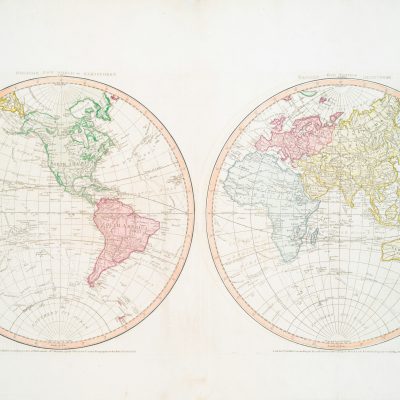After the elections in the United States, will Europe wake up?
Newsletter November 2024

By the time you read this editorial, American voters will have cast their ballots, and it looks like Donald Trump will be the next President of the United States. Many in Europe fear a return of Donald Trump, thinking that the election of Kamala Harris would have been more favourable to European interests. Are we sure? Apart from the fact that it did not reverse the trade measures initiated against Europeans by Donald Trump, the Biden administration was also the one that withdrew from Afghanistan, negotiated the AUKUS military cooperation agreement with the United Kingdom and Australia and introduced the Inflation Reduction Act without even thinking of informing its main European partners and allies. Polish Prime Minister Donald Tusk lucidly observed in a message posted on the social network X this weekend: “Harris or Trump? Some claim that the future of Europe depends on the American elections, while it depends first and foremost on us. On condition Europe finally grows up and believes in its own strength. Whatever the outcome, the era of geopolitical outsourcing is over.”
Yet it seems to be alone in preparing for the outcome of these elections and the consequences of Donald Trump’s return to the White House. Indeed, 5 months after the European elections, the parliamentary hearings of the Commissioners-designate have barely begun. The new Commission could start work at the beginning of December at the earliest. Parliamentarians seem to be busier managing current affairs than looking ahead to an uncertain future. The States, more divided than ever in the face of a geopolitical situation that is becoming more complex by the day, have probably not taken the measure of the responsibilities that will fall to them in the coming months. There seems to be a general lack of preparation as these American elections usher in 4 years that could be among the most complicated for transatlantic relations.
As a reminder, the stalling of the European economy is largely due to the insolent dynamism of the US economy. Since the COVID pandemic in 2020, that country’s growth has been three times higher than that of an almost lethargic Europe. Supported by massive public (around 30% of the country’s GDP between 2020 and 2024) and private investment, it has enabled the United States to catch up in terms of artificial intelligence and digital technology, as well as initiating its green transition and relocating strategic activities (semi-conductors, mining, etc.). For a Democratic administration, the central issue of the presidency would have been the preservation of democracy. For Donald Trump, it will be the return of a powerful America (Make America Great Again), but there is no doubt that the economic and investment effort will continue, raising the challenge for the European economy even higher. As Andreas Eisl notes, Europe’s response requires an European industrial policy capable of securing joint funding, governance, and shared conditionality within a more unified market.
Another issue is the war in Ukraine, which, if won by Russia, would place that country on the doorstep of Europe, directly threatening the countries on the Union’s eastern borders (Poland, the Baltic States). Donald Trump thinks he can impose peace overnight, and he is known to be closer to Vladimir Putin than to Volodymyr Zelensky. Furthermore, faced with a war with an uncertain outcome, it is easy to see the American desire to find a solution that would allow the United States to disengage and stop funding. Are Europeans ready for this eventuality? Are they preparing for it? Military spending has been increased by a third since the start of the war, and there have been a number of initiatives to support a ramp-up in the industry, but what kind of security strategy and/or architecture is being pursued in Europe? Cyrille Bret looks at the issue of securing the Baltic, a key objective for Europeans.
Beyond the war in Ukraine, what common position should we adopt on the various geopolitical issues in Asia, the Middle East and elsewhere? Migration policy is one such issue. In an article for the Jacques Delors Centre in Berlin, Judith Kohlenberger puts forward proposals to make it more effective. Meanwhile what are the prospects for future enlargements, with the recent elections in Moldova and Georgia underlining, if proof were needed, the geopolitical responsibility of Europeans? In a policy paper published this month, Sébastien Maillard discusses the creation of an associated state status to accompany gradual enlargement.
Finally, the US election raises questions about Europe’s economic and trade relations with the rest of the World, starting with China, then Asia and Africa, in the face of fragmented globalization. Elvire Fabry and Micol Bertolini explore this in their publication “Harris vs. Trump on Trade Policy: the Good, the Bad or just Ugly?” Faced with the challenges of economic drop-out, economic security and the the imperative of climate action, the EU, as a trading power, has to solve a challenging equation where member states’ interests may diverge significantly. Thibaud Voïta’s policy paper discusses the resilience of critical materials value chains in France, illustrating the shifts in globalization and adjustments needed to reduce dependency on critical metals. Finally, Finally, Claudia Azevedo, Pascal Lamy, Geneviève Pons and Helena Van Thiel describe how the European Commission has shaped the European trade policy at the service of its environmental ambitions. They suggest that the next Commission should now implement this green trade agenda. Finally, for a better understanding of how the Commission works, the infographic produced by Christine Verger and Lara Martelli may prove invaluable.
In conclusion, and to end on somewhat more optimistic note, it’s worth rememberingthe consensus Enrico Letta identified on his journey through over 65 European cities while drafting his report on the single market, reiterated in his recent book “Des idées nouvelles pour l’Europe” published in France: “Europe is imperfect, but it is irreplaceable“.




